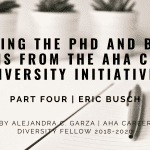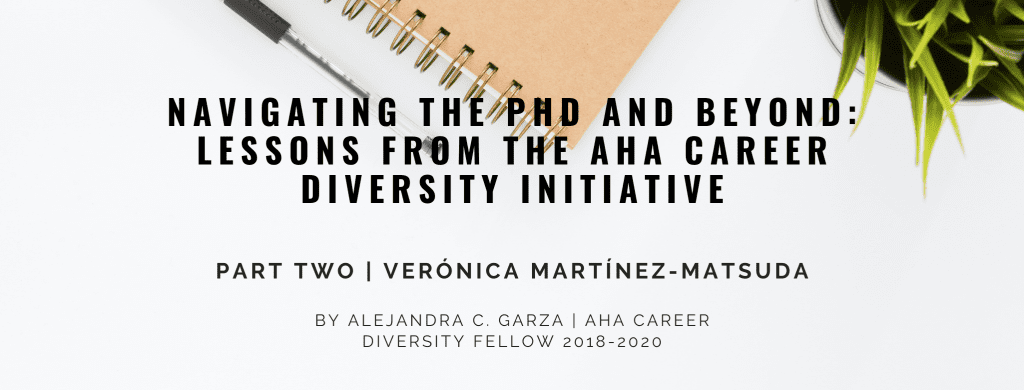
Compiled by Alejandra C. Garza, Ph.D. candidate, AHA Career Diversity Fellow 2018-2020
This is the second post in a wider series, Navigating the PhD and Beyond: Lessons from the AHA Career Diversity Initiative. The series is presented and curated by Alejandra Garza as part of the AHA Career Diversity for Historians Initiative. As the 2018-20 graduate student fellow, Alejandra’s goal was to show graduate students and professors that the skills developed in a Phd program “are applicable no matter what we do when we leave.” Read more about her experience here. This post features an interview with Dr. Verónica Martínez-Matsuda. She received her Ph.D. in December 2009 with a dissertation entitled, “The Making of the Modern Migrant: Negotiating Labor and Community in the Federal Migratory Labor Camp Program, 1935-47,” supervised by Dr. Emilio Zamora. She recently received tenure at Cornell University’s School of Industrial and Labor Relations. Here, Dr Martínez-Matsuda shares her experience of the PhD and beyond.
What motivated you to enter a Ph.D. program? Did your motivations change over the course of the program?
At the time I applied, I was burned out from the nonprofit, community work I was doing and simply saw graduate school as the next step in my education. I wanted to become a teacher, and saw myself teaching at the community-college level where I might serve students with similar backgrounds to mine as a first-generation Latina. Although graduate school was extraordinarily challenging for me—mainly because I was underprepared for how vastly different it was from my undergraduate experience, and I did not have the same resources some of my peers had—I quickly learned to love history as a profession. I began to see myself as a researcher and a writer, and not simply as a teacher. In other words, it became more evident to me as I engaged with my mentors, especially with my fellow graduate students in Chicanx/Latinx Studies across UT, that I could contribute to the profession in significant ways.
What do you wish you had learned in graduate school?
Perhaps not to be so hard on myself! I was fortunate to have found a caring and encouraging community of mentors, advisors, and allies across UT that helped me “survive” graduate school. I felt a lot of what’s commonly referred to as “impostor syndrome.” This is why I’m glad that the recent protests around racial injustice and systemic inequality have reached our profession in ways that seem more committed to real institutional change than anything I ever encountered as a graduate student or junior faculty. In my early years I would have benefited immensely from a more practical commitment to diversity in the form of professional support for first-generation, graduate students of color.
In part related to the point above, I would have also really appreciated taking a basic methods course. A class that covered topics like: How do you access certain records or documents? How do you apply a qualitative vs. quantitative approach to your research? How do scholars keep track of their sources? Such a course may have been available at the time I was a graduate student, but if it existed I wasn’t aware of it and it was not required. For students like myself, with limited first-hand research experience prior to graduate school, such a course would have lessened the stress and time wasted in figuring things out along the way.
What was your experience with the initial entry into the job market?
I think like many graduate students, I first entered the job market when I still had a couple of chapters to finish up in my dissertation. The pressure of finishing my degree made applying for jobs super stressful. And, as we know, it’s hard to compete on the job market as an ABD. Thankfully, I also applied to every postdoctoral fellowship I could find! And, that’s actually the route that helped me out the most. Both times that I went into the job market more seriously, I did so having another year available to me in the fellowship or visiting position I was in. Having another year to fall back on gave me some flexibility in terms of the jobs I considered.
The other thing I’ll mention, which I think is important to remember, is that I was often surprised by which institutions were interested in my work (and in hiring me) and which were not. Sometimes positions where I thought I was the “perfect fit” didn’t show any interest. And, on the contrary, some institutions where I thought I was a longshot invited me for an interview. I learned that you really just have to put yourself out there. At the very least, more scholars will have read your work and become familiar with your research.
How did you earn the position you currently have?
This is a good example of what I was just referring to. I only applied to Cornell’s ILR School because it was a visiting position for two years. I didn’t think I was a great fit because I didn’t see myself as a traditional labor historian—i.e., studying industrial unions, or factory workers, etc. But, because it was only a visiting position, I applied thinking I could teach there for a couple of years while I published some work and gained some experience. Well, after one year of that visiting position, the department opened up a tenure-track line in history and I got the job! I know this is rare, but getting hired out of a visiting appointment can happen and I think sometimes we close ourselves off to those possibilities.
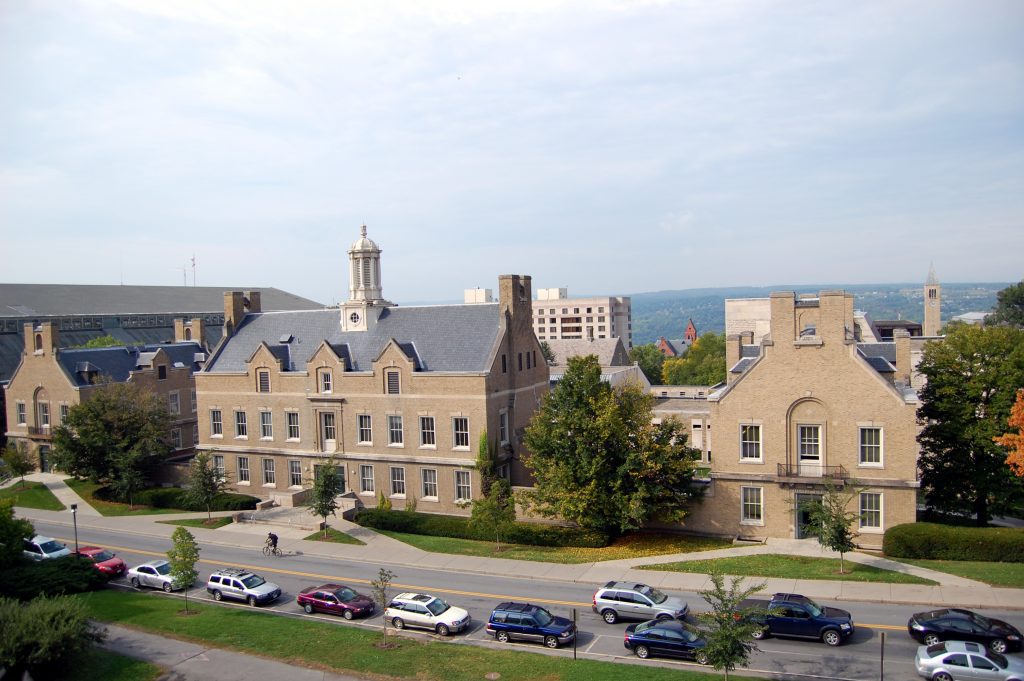
If COVID-19 has impacted or even taken your job in these difficult months, please share that with us, too.
Well, it’s certainly impacted my job—but, it’s impacted everyone’s job! Of course, it’s not impacted everyone’s job in the same way, and I do recognize how incredibly privileged I am to be tenured at a well-resourced institution during this crisis. As universities respond to the pandemic, many adjunct and contingent faculty, as well as graduate students, are experiencing even more harmful cuts and compromises to their working conditions that do not safeguard their wellbeing. As a member of the American Association of University Professors (AAUP), I have truly valued the work being done across campuses to protect the rights and security of all academic professionals during these times. I would encourage all graduate students to consider becoming a member of the AAUP.
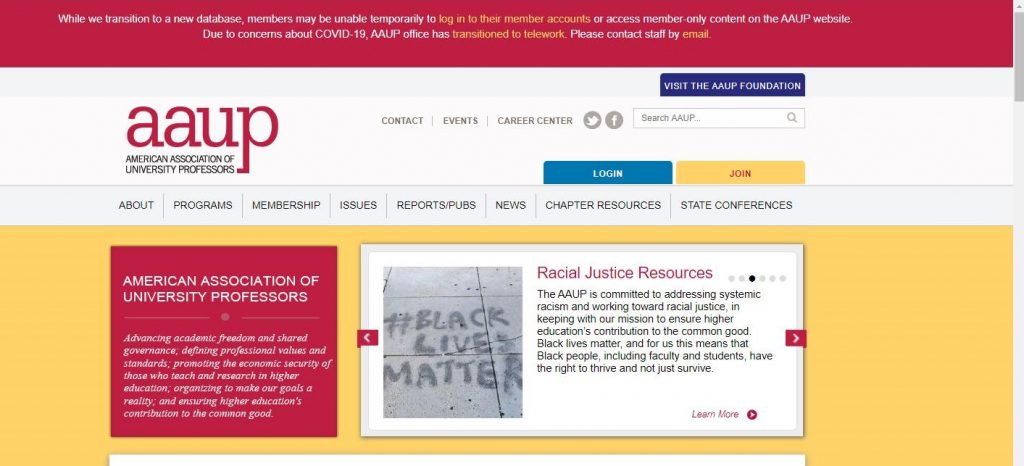
Any other advice you have for new PhDs entering the job market?
It’s true that entering the market is tough—even when there isn’t a pandemic to deal with! So, my first piece of advice is that it’s important to take care of your mental health throughout the process. Remind yourself often of the many things in life you love, that bring you peace and happiness, beyond the profession and your work. Odds are that it’s these things that will sustain you in your career and make you a better historian in the end.
My more practical advice is that you have to apply for a lot, even to those places or positions you don’t think you’d consider, and take the time to craft your applications so that they are detailed to the job or position. Have people read your cover letters, offer feedback on your writing samples, etc. Also, remember why you love this work! It’s good to be confident and competitive in the market, but be mindful of how you communicate this to others. People will respond to your enthusiasm and sincere passion for your work, so there’s no need to be arrogant, which might dissuade others from wanting you as a colleague. Personality does factor into hiring decisions.
For those who still have some time before they enter the market, my advice is to be persistent in applying for fellowships, grants, and other external opportunities, such as participating in conferences. During my time as a graduate student, mainly out of financial necessity, I applied for a lot of external fellowships. Although they can be incredibly time consuming to prepare for, they are absolutely worth your time! Regardless if you get the award or not, your project becomes sharper every time you refine your application. And, in the process of being considered for the award or position, other scholars become more familiar with you and your research. All of this pays off when it’s time to enter the job market.
This series was created by Alejandra C. Garza with assistance from Dr. Alison Frazier and Dr. Michael Schmidt as part of the AHA Career Diversity for Historians Initiative 2018-2020.
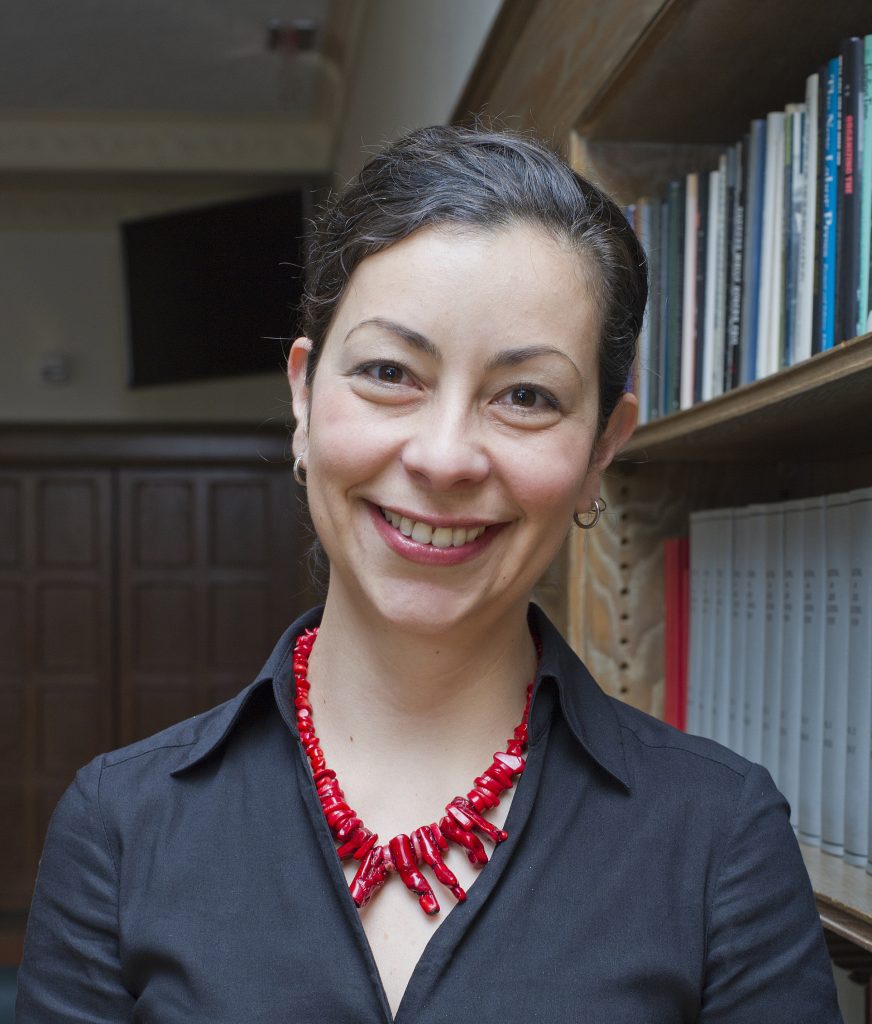
Dr. Verónica Martínez-Matsuda received her Ph.D. in December 2009 with a dissertation entitled, “The Making of the Modern Migrant: Negotiating Labor and Community in the Federal Migratory Labor Camp Program, 1935-47,” supervised by Dr. Emilio Zamora. She recently received tenure at Cornell University’s School of Industrial and Labor Relations.
The views and opinions expressed in this article or video are those of the individual author(s) or presenter(s) and do not necessarily reflect the policy or views of the editors at Not Even Past, the UT Department of History, the University of Texas at Austin, or the UT System Board of Regents. Not Even Past is an online public history magazine rather than a peer-reviewed academic journal. While we make efforts to ensure that factual information in articles was obtained from reliable sources, Not Even Past is not responsible for any errors or omissions.



